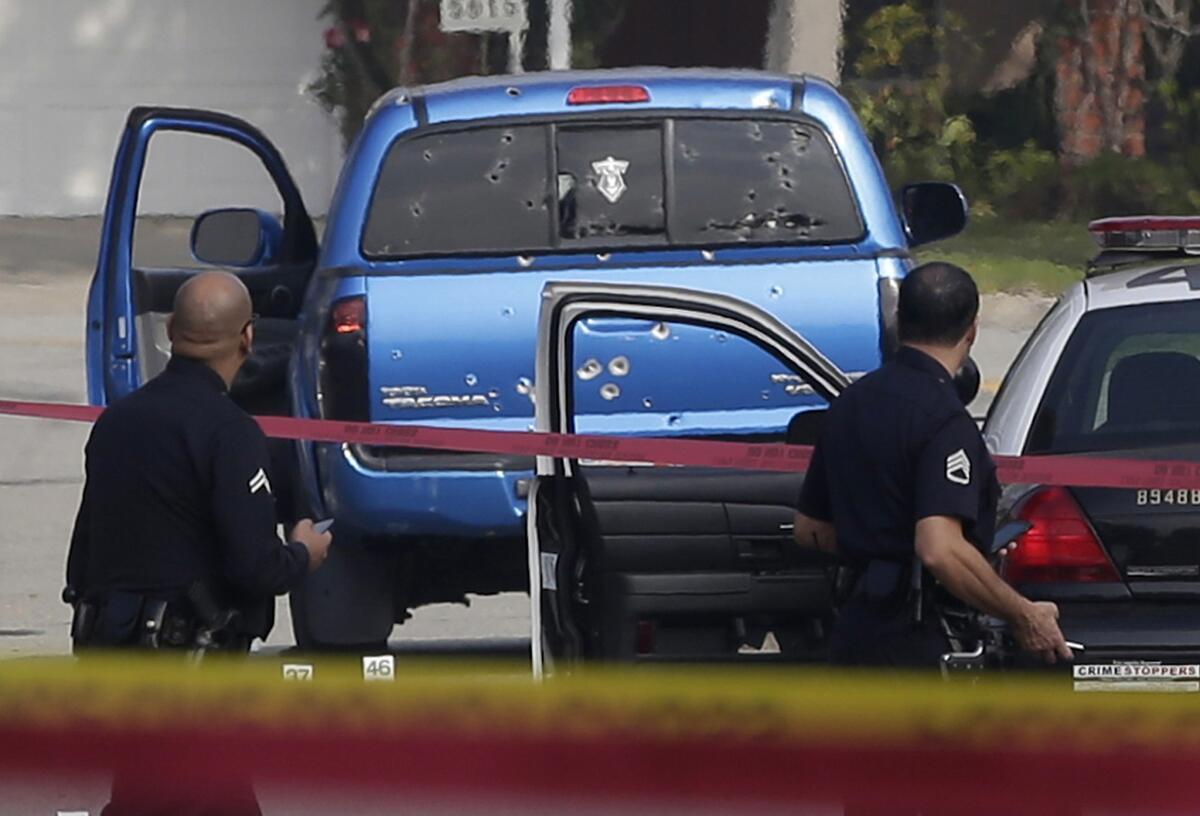Editorial: How do we police the police?

Law enforcement officers look over the scene where Margie Carranza and Emma Hernandez were wounded after being misidentified during the hunt for rogue ex-cop Christopher Dorner, on Feb. 7, 2013.
Imagine a man sitting on his front steps in the early morning hours, drinking his coffee and reading, on his tablet, about a rogue ex-cop, armed, dangerous and rampaging through the city. The man on the steps is on edge. When his newspaper hits the driveway it somehow sounds to him like a gunshot, and he looks up to see what at that unnerving moment he takes to be the terroristŌĆÖs vehicle. He happens to have a gun, and it is within reach ŌĆö so he grabs it and opens fire.
But itŌĆÖs just the newspaper delivery truck, and inside, his bullets strike a terrified 71-year-old woman in the back and send shattered auto glass flying, some of which cuts up her daughter. These two unarmed and non-dangerous Latino women bear little resemblance to the crazed, 33-year-old African American ex-cop said to be roaming the city.
Would the man on the steps escape criminal charges for shooting at them?
DonŌĆÖt be ridiculous. Imaging him trying to explain to the officers that are sure to show up at the scene that it was all one big misunderstanding. ItŌĆÖs impossible to know for certain, but itŌĆÖs a pretty good guess that the booking officer ŌĆö and the district attorneyŌĆÖs office ŌĆö would shake their heads and say, ŌĆ£Tell it to the jury.ŌĆØ
Too often in the course of the nationwide conversation about police use of force, critics of police reduce the matter to a binary equation... But it is not binary.
Of course, in reality it was not a man sitting on his front steps on Feb. 7, 2013 who opened fire on a newspaper delivery truck and struck an innocent mother and daughter in the midst of the hunt for ex-LAPD officer and suspected killer Christopher Dorner. The shooters were LAPD officers protecting the home of a police captain who they had been told was a possible Dorner target. And they were told that as officers, they too were targets. On Wednesday, L.A. District Attorney Jackie Lacey released a heavily redacted report that explained her decision not to pursue criminal charges against them: Given the totality of the circumstances, she said, any officer might reasonably have believed that he or she had to shoot in self defense, or at least that it would be very difficult to prove otherwise beyond a reasonable doubt.
Police officers should of course be held to high standards of conduct. They are imbued with extraordinary authority, including the power to use deadly force, and misuse of that authority should carry serious consequences. When officers have demonstrated an inability to think clearly under pressure, they should be told to find themselves a different line of work.
Should they also face criminal charges? Too often in the course of the nationwide conversation about police use of force, critics of police reduce the matter to a binary equation: Either the officers acted properly, with good cause, and set an acceptable standard for other officers to follow; or they behaved criminally and deserve to be tried and convicted. Justice, the critics argue, requires police officers who act wrongly to go to prison.
But it is not binary. Wrongful officer actions often fall well short of criminal conduct and call for responses far outside the criminal justice realm. The standard for holding an officer to answer for a crime should be no lower than it would be for anyone else.
It shouldnŌĆÖt be any higher, either, though, and thatŌĆÖs the vexing point. The standard under current law is not how the average person sitting on his steps would act in the situation, but how a reasonable officer would act. Officers are more often placed in life-threatening situations than the rest of us by the very nature of their work, although such situations can be exacerbated by poor training or poor oversight, as may have been the case in the newspaper shootings. But the standard for reasonableness of their actions shouldnŌĆÖt be slacker just because they are under stress more often. Consider the officer who shot an unarmed homeless man in Venice last May, and who is currently the subject of an investigation by the district attorney over whether to bring criminal charges. He was most certainly under a level of stress that most people seldom feel in their daily work. But should that stress cut him extra slack when determining whether his action was reasonable? Or should the authority embodied in his badge and his uniform revoke any special consideration given to the circumstances of the shooting?
The decision not to charge the Dorner officers might have been of less concern if the public were privy to whatever discipline was imposed on them. But current law keeps that information confidential, so we are left, again, to see official reaction to a police shooting in an unenlightening, binary fashion.
Follow the Opinion section on Twitter @latimesopinion and Facebook
More to Read
A cure for the common opinion
Get thought-provoking perspectives with our weekly newsletter.
You may occasionally receive promotional content from the Los Angeles Times.










